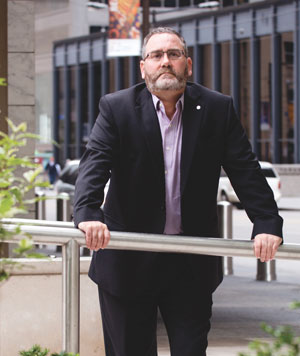"We only had one killed and one wounded in our company, not including two men who went nuts from being close to exploding minenwerfers, which are more dangerous to one’s nerves than to one’s body.”

Those are words from the diary of George L.B. MacKenzie, a law student who died in the First World War.
Many decades after MacKenzie penned those words, a Toronto lawyer sat through a Remembrance Day ceremony at Osgoode Hall and heard MacKenzie’s name listed with 60 Ontario law students never called to the bar because they had perished in the war.
“For some of the names they read off, instead of giving the year of call, what the person reading the names said was, ‘Never called,’” says Patrick Shea, a partner at Gowling Lafleur Henderson LLP in Toronto.
“They didn’t say student-at-law. They just said, ‘Never called.’”
Something about hearing the students’ names followed by the words “never called” didn’t sit well with Shea.
He wrote a letter to former Law Society of Upper Canada treasurer Tom Conway proposing that as 2014 marks the 100th anniversary of the start of the war, the regulator should posthumously call the students who never became lawyers to the bar of Ontario.
Conway liked the idea. “The treasurer gets lots of suggestions to do lots of projects and most of them for some reason or another are not realistic,” says Conway.
“But this one just immediately had an appeal to me and it had an appeal for virtually everyone I talked to about it.”
He adds: “The two wars, particularly the First World War, had a very deep and lasting impact on the many generations of the legal profession. It still has effects. So I thought: What a great way to commemorate the young men who gave up their legal studies — they thought they were going for a few weeks or a few months — and never came back.”
The law society will honour the students on the eve of Remembrance Day this year at a special ceremony that will draw some of their family members. They’ll travel from as far away as California to attend the event.
Sitting outside Osgoode Hall on a warm summer morning, Shea flips though a book of biographies he drafted for each of the students who died in the war. The bankruptcy and insolvency lawyer spent a year digging up their stories, trying to locate any family members who could receive certificates on their behalf.
He says finding out about the students well beyond their year of birth and death was important to him.
“Once you go down the path of looking at their stories, you have to keep going,” says Shea.
“There’s something compelling about telling the story of someone who is not able to tell his own story. For some of these people, there is no one else to tell their story because their families have long since died out.”
Shea took to the Internet and various archives to find the descendants of the students and reached out to family members he found. He travelled as far as Alberta to scour archives containing information about the students and their backgrounds and spent his vacation days at another archive in Ottawa. He decided early on that reconstructing the students’ stories would be a priority for him this year. “It’s been a journey but nowhere near the sacrifice these individuals have made. So it’s worthwhile,” he says.
Shea found out about the students’ families, hometowns, where they went to school, when they enlisted, how they died, and even bits about their personal lives. In one case, he found a letter Capt. Gerald Blake, the great grandchild of the founder of the law firm now known as Blake Cassels & Graydon LLP, wrote to his fiancée Katherine on June 19, 1915.
“I felt wretched leaving you looking so wretched and so we’re pretty wretched all around,” wrote Blake.
“But someday if I hadn’t gone we all would have been ashamed. I would have been a grouch for the rest of my days — and now perhaps I will be only half the time!”
There’s also Lieut. Roy Biggar, whose father practised law in Hamilton, Ont., as a partner at the Biggar & Lee law firm.
Some, like Capt. Stanley Brocklebank, received the Military Cross, and their medals and why they received them will be part of the collection of biographies printed in a book for the November posthumous call ceremony.
The students came from various places in Ontario and had diverse family and economic backgrounds, says Shea.
“There is no single thing that you can say each of these individuals had in common except for the fact that they were all students here at Osgoode.”
The November event will be the first time the law society will honour a group of law students posthumously.
“When it comes to the ultimate sacrifice that our members gave, it’s important that we remember them and that we recognize that their contributions were significant for our country and for our history,” says Conway.
“It’s not to celebrate war,” he adds.
“It’s rather to remember what the cost of war truly is.”
To watch a video related to this story, see "
Honouring law students killed during First World War."

 Those are words from the diary of George L.B. MacKenzie, a law student who died in the First World War.
Those are words from the diary of George L.B. MacKenzie, a law student who died in the First World War.